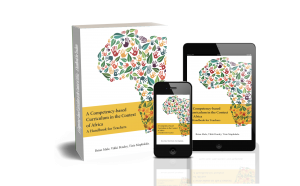“The school curriculum must prepare young people for an ever-changing future. To do this, we need young people to develop the key competencies that will enable them to cope with life in the 21st Century.” Nelson Mandela.
Sometimes it seems to us as teachers that the barriers can be great, and it can seem difficult, if not impossible, to find good opportunities for learning. We may have large classes and seemingly scarce resources with little support, and opportunities seem few and far between.
This book will show how the enthusiasm of young people can be harnessed and how we can use whatever resources are available to us locally to create the educational opportunities that meet the needs of all learners.
A Competency-based Curriculum in the Context of Africa – A handbook for teachers will be published in Africa by Mountain Top Publishers, Kenya in October 2022. The book will be available beyond Africa via a platform soon to be revealed!
If you would like to pre-order a copy, please Get in touch.
If you would like to see a little more of the book, download this flyer to read the Preface. You can explore the Table of Contents also.
Preface and contents list CBC Flyer(1)
Endorsements
A comprehensive book on competency-based curriculum with essential perspectives from a range of African countries. This book successfully deconstructs the curriculum through rich information drawn from world-renowned curriculum pioneers, blended with essential perspectives from African scholars. A roadmap to competency-based curriculum linking teaching and learning with 21st century skills, demystifying quality and context notions, presents relevant cases through thought-provoking questions and a good mix of activities and stories clearly depicting varied African contexts. A valuable guide for teachers!
Professor P.L. Mabunda, Deputy Executive Dean, College of Education, University of South Africa.
This Handbook for teachers explains the benefits of a curriculum that focuses on how young people can apply their learning in their lives. The design process that is mapped out so well in this book will help help teachers to create a curriculum that will make learning exciting and that will meet the needs of learners from a wide variety of backgrounds and circumstances such as we have in South Sudan. I am pleased to endorse this book for all teachers who want to make learning meaningful and enable all learners to reach their true potential.
Omot Okony Olok, Director General of Curriculum Development, Ministry of General Education and Instruction, South Sudan.
This Handbook will encourage and enable teachers to design a curriculum that will equip all learners with the knowledge, understanding and skills to thrive in the 21st Century. Through the design process presented in this book, teachers will increase their own competencies in creating learning experiences that will help learners to develop attitudes and attributes to navigate through our rapidly changing world. Each Chapter takes a teacher through essential stages of curriculum design, importantly ensuring that principles of equity and inclusion are promoted and that the local context is recognised to be the foundation for success.
Grace K Baguma, Director of the National Curriculum Development Centre, Uganda.
This excellent book focuses on the curriculum in the context of Africa but illustrates principles that apply across the world, and are at the heart of the approach taken by OECD to the ‘2030 Future of Education and Skills’. This book should be read everywhere.
Professor Mick Waters, University of Wolverhampton, former Director of Curriculum in England.
* * * * * * * * * * * * * * * * * * * * * * * * * * * * * * * * * * * * * * * * * * * * * * * * * * * * * * * * * * * * * * * * * * * * * * * *
Authors
Brian Male
Brian Male is a curriculum design specialist and a director of the Curriculum Foundation UK. He is a former the head teacher, inspector, advisor, lecturer and principal consultant to the Qualifications and Curriculum Authority in England. He worked for UNESCO’s International Bureau of Education, and for the last ten years he has worked extensively on national curriculum projects in Africa, including Lesotho, Morocco, Rwanda, South Sudan and Uganda. His previous books include the Primary and Secondary Schools Curriculum Design Handbooks.
Vikki Pendry
Vikki is a curriculum designer specialising in primary school pedagogy, assessment and sustainable development in Low- and Middle-Income Countries. Vikki is the CEO of the Curriculum Foundation and is currently pursuing a doctorate in education at University College London with a focus on supporting the Professional Development of teachers to implement a Competency-based curriculum. Vikki has worked extensively with education leaders in Sub-Saharan Africa over the last 10 years. This role is complemented by a 20 year track record of developing teaching and learning materials for organisations such as Save the Children, HSBC and The World’s Largest Lesson and her former experiences as a Deputy Head Teacher. Vikki has conducted research into Teacher Effectiveness in Bangladesh, the use of ‘EdTech’ in low resource settings and the impact of Covid-19 on education in South Sudan.
Tizie Maphalala
Tizie’s experience in the education sector spans more than 35 years, 21 countries and all levels of the system. Tizie started her career as a secondary school teacher and went on to become a teacher educator. Feeling the urge to engage in education policy and strategy, she joined UNICEF where she worked for 17 years as Education Specialist first in Eswatini, Ethiopia, South Sudan and Zambia then as the specialist advising on equity and gender programming in education for the 21 countries in Eastern and Southern Africa. In her work, Tizie has contributed to evidence generation in the education sector, provided leadership in and authored public goods on effective learning environments, curriculum development, equity in education, schools as safe places for learning particularly in low-resource environments.


Please we need syllabi for all subjects
Very relevant material for us all, Africans.
CBC is the way to go for 21st century education